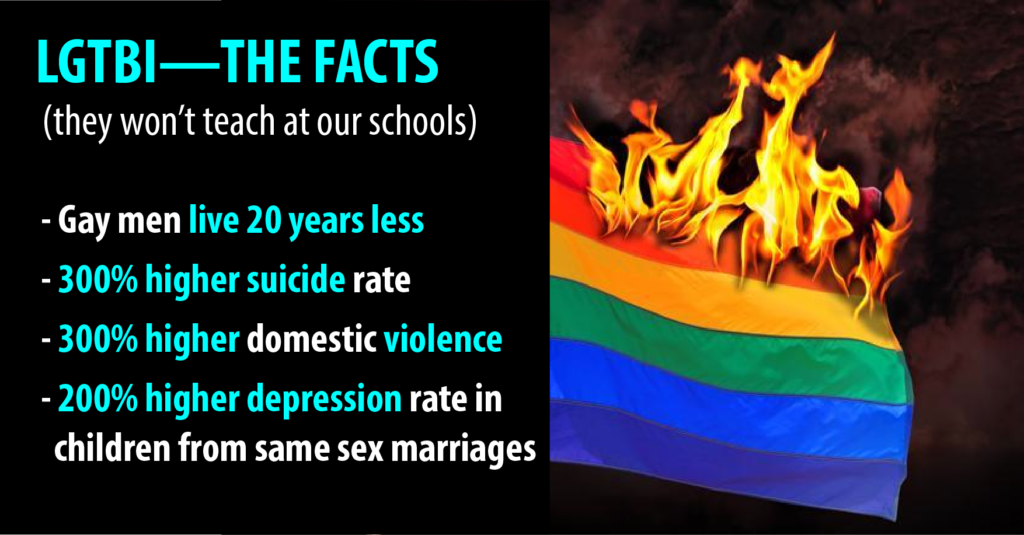 As a society we are being conditioned to accept that LGBTI is a legitimate lifestyle choice. In Victoria and Canberra parents are being forced to have their children preached this message under “Safe Schools” complete with descriptions on what each of those same lifestyle choices entail. The problem with this LGBTI (Humanist) Agenda is that they are just not telling the whole story.
As a society we are being conditioned to accept that LGBTI is a legitimate lifestyle choice. In Victoria and Canberra parents are being forced to have their children preached this message under “Safe Schools” complete with descriptions on what each of those same lifestyle choices entail. The problem with this LGBTI (Humanist) Agenda is that they are just not telling the whole story.
These are the facts from four recent studies that need to accompany all discussion on LGBTI life choices.
- Gay men live 20 years less than their opposite sex counterparts.
- Suicide in gay couples is 300% higher than opposite sex couples.
- Domestic Violence is up to 300% higher in same sex coupling.
- Children of same sex couples are 200% more depressed.
Our schools are doing a fine job educating children about dangerous activities such as smoking and the use of illegal drugs. But they are increasingly teaching that homosexuality is the same as heterosexual behaviour—It certainly isn’t. These studies prove that homosexual activity literally, is much worse than smoking, and yet the schools continue to teach that it is normative and safe behaviour. We must demand that schools and media now start delivering ALL of the facts otherwise we fail as a community to safeguard our innocents. Here are the Studies.
STUDY : Confirms Gay Life Expectancy 20 Years Shorter
WASHINGTON, DC, June 6, 2005 – A new study which analyzed tens of thousands of gay obituaries and compared them with AIDS deaths data from the Centers for Disease Control (CDC), has shown that the life expectancy for homosexuals is about twenty years shorter than that of the general public. The study, entitled “Gay obituaries closely track officially reported deaths from AIDS”, has been published in Psychological Reports (2005;96:693-697).
In an interview with lifesitenews.com, Dr. Paul Cameron, the President of the Family Research Institute and the scientist who headed the study, indicated that he was not at all surprised by the findings. Rather he said that it only served as further confirmation for what had long been known and other studies have already shown.
One such study was conducted in Vancouver British Columbia and published in 1997 in the International Journal of Epidemiology (Vol. 26, 657-61: http://ije.oxfordjournals.org/cgi/content/abstract/26/3/657). It almost exactly mirrors the findings of Cameron’s research.
The Vancouver study was conducted by a team of pro-gay researchers, who, upon finding that pro-family advocates were using the results of their research as confirmation for their beliefs about the risks of the homosexual lifestyle, issued a statement trying to curb this unintended after-effect. “The aim of our work,” said the research team, “was to assist health planners with the means of estimating the impact of HIV infection on groups, like gay and bisexual men, not necessarily captured by vital statistics data and not to hinder the rights of these groups worldwide. Overall, we do not condone the use of our research in a manner that restricts the political or human rights of gay and bisexual men or any other group.”
Despite their attempts to downplay the practical consequences of their research, it is difficult to ignore that the study concluded with the statement that “under even the most liberal assumptions, gay and bisexual men in this urban centre [Vancouver, BC] are now experiencing a life expectancy similar to that experienced by all men in Canada in the year 1871.” Corresponding almost exactly with Cameron’s study, the Vancouver study indicated that “life expectancy at age 20 years for gay and bisexual men is 8 to 20 years less than for all men.”
Dr. Cameron indicated that he hoped the sobering results of the new study, in addition to such similar past studies, would finally cause a “reexamination”, saying that “our society needs to reassess what it’s doing with those who engage in homosexuality.”
The schools, he said, are doing a fine job educating children about dangerous activities such as smoking and the use of illegal drugs. But they are increasingly teaching that homosexuality is the same as heterosexual behaviour. “It certainly isn’t,” said Cameron. “Here we have homosexual activity, which, literally, is much worse than smoking,” and yet the schools continue to teach that it is normative and safe behaviour.
STUDY: People in homosexual ‘marriages’ almost 3 times more likely to commit suicide: study
Homosexuals who “marry” each other are almost three times more likely to commit suicide than their heterosexual counterparts, even in very gay-friendly Sweden, according to a study published in the May issue of the European Journal of Epidemiology.
The authors of the study noted that social intolerance of homosexual behaviour could not so easily be blamed for increased suicide risk, given that Sweden is known for its accepting attitude towards same-sex relationships.
“Even in a country with a comparatively tolerant climate regarding homosexuality such as Sweden, same-sex married individuals evidence a higher risk for suicide than other married individuals,” the authors note.
The study, “Suicide in married couples in Sweden: Is the risk greater in same-sex couples?” used the government of Sweden’s detailed databases to compare a population of over six thousand homosexual “married” couples to the larger population of heterosexual couples who married during the period between 1996 and 2009, following them until 2011.
The study found that participants in homosexual marriages had an overall 2.7 times greater chance of suicide than participants in heterosexual marriages, with the true value having a 95% probability of falling somewhere between 1.5 and 4.8.
Homosexual men in same-sex “marriages” were found to have a higher elevated risk (2.9) than women (2.5).
The study’s results are similar to numerous other studies in recent years that have found a strong relationship between homosexual behaviour and a variety of negative psychological outcomes, even in countries that are very accepting of homosexual behaviour.
Studies done of homosexuals in the Netherlands, which is the country most accepting of homosexual behavior in the world, have found that homosexuals suffer from significantly higher rates of mood disorders, anxiety disorders, substance abuse disorders, suicide attempts, eating disorders, and panic attacks.
The behaviour of homosexuals, which often involves high levels of promiscuity and instability in their interpersonal relationships, results in rates of 10-20% HIV infection of homosexuals living in urban areas, as well as elevated incidence of herpes and the cancer-causing Epstein-Barr virus, syphilis, anal cancer, and other diseases
STUDY: Domestic Violence 300% higher with same sex
Two Studies That Prove Domestic Violence Is an LGBTI Issue
The National Violence Against Women survey found that 21.5 percent of men and 35.4 percent of women living with a same-sex partner experienced intimate-partner physical violence in their lifetimes, compared with 7.1 percent and 20.4 percent for men and women, respectively, with a history of only opposite-sex cohabitation. Transgender respondents had an incidence of 34.6 percent over a lifetime according to a Massachusetts survey.
The CDC’s 2010 National Intimate Partner and Sexual Violence Survey, released again in 2013 with new analysis, reports in its first-ever study focusing on victimisation by sexual orientation that the lifetime prevalence of rape, physical violence, or stalking by an intimate partner was 43.8 percent for lesbians, 61.1 percent for bisexual women, and 35 percent for heterosexual women, while it was 26 percent for gay men, 37.3 percent for bisexual men, and 29 percent for heterosexual men (this study did not include gender identity or expression).
STUDY: Children suffer twice the depression rate than children from opposite sex parents
A new study – conducted by Donald Paul Sullins, a sociology professor at the Catholic University of America – has been released that is the first of its kind with regards to homosexual parenting. It took a longitudinal approach – meaning that the study focused on the same participants of the representative sample over the course of many years for the purpose of exploring the long-term effects of living under same-sex parents. This time, the children of same-sex parents were interviewed at different times in their lives – ages 15, 22, and 28. Not surprisingly, the study yielded a much different result compared with previous studies.
The research article – called Invisible Victims: Delayed Onset Depression Among Adults With Same-Sex Parents – was published in the journal Depression Research and Treatment.
Specifically, “at age 28, the adults raised by same-sex parents were at over twice the risk of depression as persons raised by man-woman parents,” reads the study abstract.
“As the first study to examine children raised by same-sex parents into adulthood,” says Sullins, “this exploratory study aims to contribute new information for understanding the effects of same-sex parenting through the life course transition into early adulthood.”
Sullins used data from the National Longitudinal Study of Adolescent to Adult Health (“Add Health”), which monitors the development of a sample of Americans from age 15 to 28,
to ensure his sample would be as representative as possible.
The study found that children raised by homosexual parents were more than twice as likely to be depressed as adults as were their peers raised by opposite-sex parents.
Although children of same-sex parents were slightly less likely to be depressed during adolescence, more than half suffered depression symptoms as adults.
Sullins examined a variety of factors that have been shown to be related to depression, including child abuse, obesity, perceived stigmatization and parental distance.
Children raised by homosexual parents showed higher rates of all these factors than their peers with heterosexual parents.
In addition, 92 percent of those interviewed during the course of the study reported being abused in some way as kids – whether it was verbal, physical, or emotional abuse – particularly those of lesbian parents. In comparison, 58 percent of those with heterosexual parents reported some kind of abuse. Twenty-three percent of those interviewed for the same-sex parenting study reported being sexually abused as kids.
The views expressed in this opinion article are solely those of their author and are not necessarily either shared or endorsed by EagleRising.com
Catholic University of America, Depression LGBT same-sex parents study / Donald Paul Sullins
See related articles:
Physician Says Science of Medical Consequences of Homosexual Behaviour is Being Trumped by Political Agenda
https://www.lifesitenews.com/ldn/2003/sep/03092008.html
The Negative Health Effects of Homosexuality
http://www.frc.org/get.cfm?i=IS01B1
Same-Sex ‘Marriage’ a Health Risk Doctors Warn Parliamentarians
https://www.lifesitenews.com/ldn/2005/feb/05021709.html




4 thoughts on “LGBTI—the facts they don’t want you to know”
Can you please explain why you include intersex people in this (I.e. the ‘I’ in GLBTI)? Intersex people are born with a biological variation of sex characteristics. They are not trans. Most are heterosexual.
It seems intersex are included here without due consideration. None of the supporting arguments, research or references relate to people with intersex variations either.
These are symptoms of the homophobia and judgement that gay men (and other LGBTQI+ people) go through. HIV is being managed and prevented more than EVER right now, the rest is caused by bigotry. These statistics will drop when people stop fighting us for being who we are.
The last part about the children does not come from a legitimate, reputable study. Many far more credible studies have disproven this ‘fact’.
*cough* bullshit
The reasons why the depression and suicide rates are so high in the LGBTI community is because of the hate from fucktards that publish bullshit like this. Multiple studies have proven that life outcomes for children from same sex parents fare no worse to better than from hetero parents.
Cameron has been debunked by Hogg RS showing life expectancy varies now by months.
It is like saying heterosexuals die at age 40 on average due to the Black Death 4 centuries ago, or the Spanish flu, or Cholera, or…